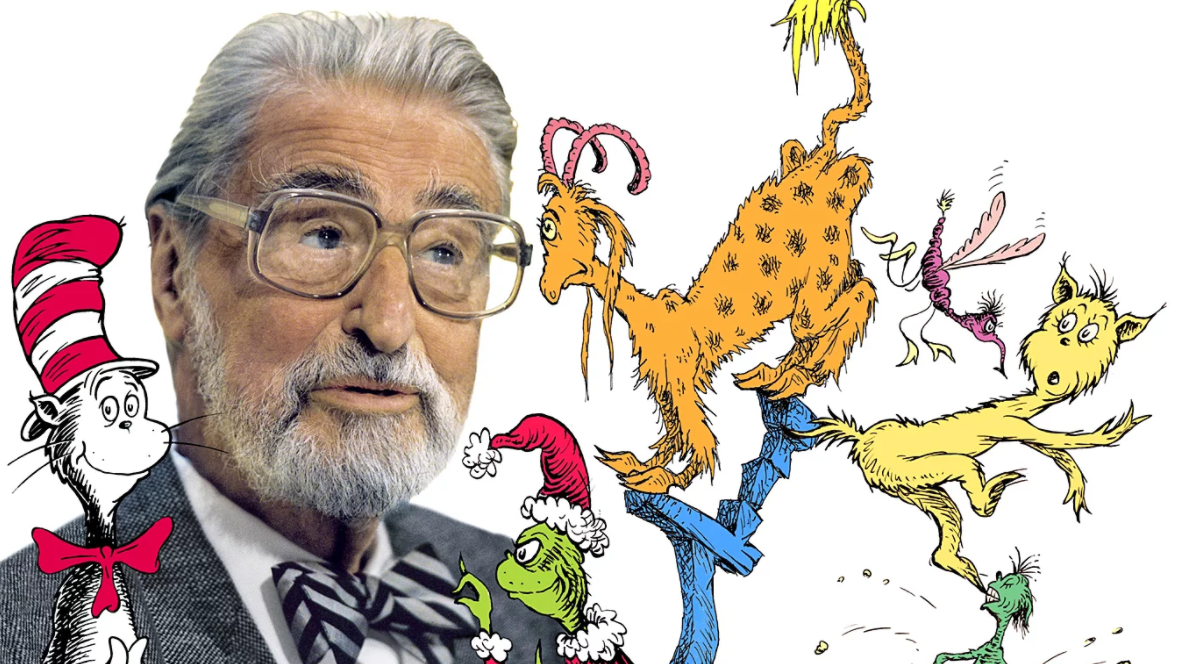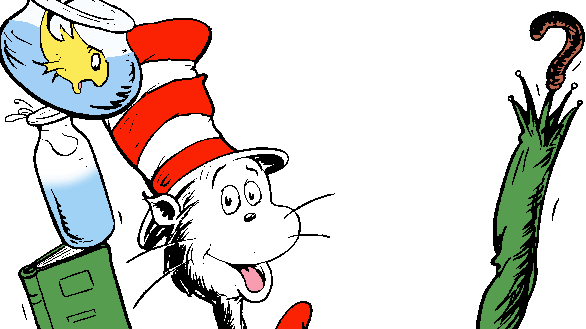
Growing up, my copies of The Cat in the Hat and Green Eggs and Ham sat on my shelf next to Goodnight Moon and Where the Wild Things Are. Over the years, many Dr. Seuss classics have found their way next to my copies of Making Things Happen and The Power of Emotional Intelligence. What once were some of my favorite childhood books have morphed into light reference reads for my career as a Project Manager at Cake & Arrow.
I look at my role as a Project Manager as a facilitator, a guide, a remover of obstacles. I am solutions oriented, data driven and fact-based. But like everyone at Cake & Arrow, I’m also a storyteller. It is through stories that we connect with, surprise, and delight our users and ourselves, and Dr. Seuss, through his writing and animation, is a prime example of how to do it well.
Earlier this month kids all over the globe celebrated Dr. Seuss day in honor of what would have been his 113th birthday. While he is no longer with us, his legacy lives on in the pages of his books, and, without even knowing it, we’ve brought many of his lessons into the workplace. No matter where we are within the project lifecycle, there’s always a Dr. Seuss reference that can be called upon to shed some insight into how to move forward. Among the many influences Dr. Seuss has had on our culture, there are five simple truths that continue to hit home when it comes to what we do day in and day out.
–
You Matter. Everyone Does.
“So, open your mouth, lad! For every voice counts!” — Dr. Seuss
At Cake & Arrow we embrace the idea that “We are all Designers.” This sentiment is one of the many reasons I’ve worked here for over a decade. No matter our role, we all have a seat at the table whether it is helping to shape company policy, set direction for a project, or solve problems. We are encouraged to share our opinions, to speak up, to escalate when necessary, and to lead. Yes, everyone has their expertise, but we are all leaders and we all have a unique voice. And our voices matter. When a company truly embraces this mentality, there are no wrong answers – as long as they are accompanied by a well-thought-out rationale. Together we lead by connecting the dots between actions and values in our own ways. So, regardless of how big or small our teams are, we acknowledge the people who make them up. We are forever works in progress, constantly asking for feedback from each other and our users. If everyone sat quiet, we’d get nowhere fast.
Play to your strengths.
“Today you are You, that is truer than true. There is no one alive who is Youer than You.” — Dr. Seuss
We all bring something unique to the table and naturally fall into our distinct roles of Project Manager, Designer, Developer, etc. There is no one person with the same skills, passion, point of view, and expertise. Over the years at Cake & Arrow, performance reviews went from focusing on being “well-rounded” to giving ourselves permission to focus on individual strengths and passions. This is not to say that developing new skills and working on weaknesses is not important, but we recognize that people’s strengths often line up with what they love, and we are encouraged to play to these strengths. This has resulted in employees bringing their personal passions into the workplace: bakers bringing their latest creations to the table, artists creating works of art for display in our office, fitness enthusiasts finding time and resources within the workday to practice yoga and meditation, philanthropists setting up charity events and more. All of this means happy employees doing what they love and one of the many reasons we’ve been voted a Best Place to Work two years in a row.
Invest time in learning what drives others.
“It’s better to know how to learn than to know.” — Dr. Seuss
Knowledge, is, as they say, power, but it’s really understanding how to get the best out of others that makes us successful. Learning styles and preferences vary — that goes for our colleagues and our users. We’ve all filled out our DiSC profiles, one of the leading personal assessment tools used to improve productivity, teamwork and communication.
There is something extremely powerful in understanding people’s behavioral differences and using this knowledge to foster better relationships and collaboration. Based on the context of information being shared, it’s extremely important to consider how to display it. For our colleagues, this is where understanding their DiSC profile comes in. For our users, this is where understanding our target audience and user testing is important. Learning how others learn is what drives results.
Strike a balance.
“Step with care and great tact, and remember that life’s a great balancing act.” — Dr. Seuss

This can be applied to so many things. The work-life balance, the balance of content vs. commerce in what we create, the balance of professional and personal relationships we all have, etc. It’s all about being aware of how one thing affects another. This hits close to home for me with regards to physically getting things done and taking the time to just think, which brings me to…
Find value in non-doing.
“Think and wonder, wonder and think.” — Dr. Seuss
In today’s world of multimedia flooding our senses at all times, it’s harder now than ever to put a pause on productivity. The daily rush against the clock provides the illusion that the more we do and the more we accomplish, the more successful we will be. We are addicted to visible progress, and now that we have the digital devices to store them, we have a hard time looking away or shutting them off. As we fill up every moment, we leave no space to observe what’s going on in our minds, less opportunity for clarity and insight, and less room for creativity or new ideas to be born.
We tend to not give ourselves permission to take a few minutes to slow down, observe and recharge. It’s important we find comfort in a state of being, rather than doing.
Can you sit still for two minutes?
You may be surprised what comes of it.
–
As we create and solve for the human experience, simple sentiments from Seuss (say that five times fast) find their way from the bookshelf to my mind. In a 1984 interview, Dr. Seuss is quoted saying, “Outside of my beginner books, I never write for children. I write for people.” He sure did.